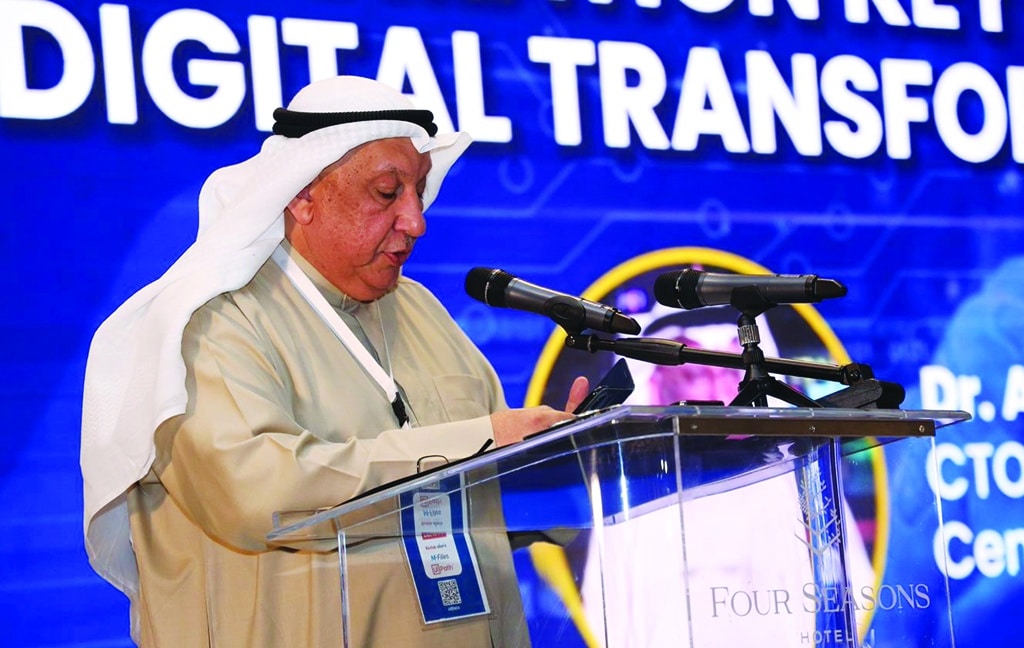By Sajeev K Peter
KUWAIT: Digital transformation is a fundamental pillar on which "New Kuwait Vision 2035" is based, therefore, both government and private sectors aspire to increase operational efficiency in all departments to improve the level of quality and push the economy towards a secure digital transformation, said Dr Anwar Al-Harbi, Chief Technology Officer at the Central Agency for Information Technology (CAIT) in Kuwait.
Delivering his opening speech at a technology conference on Wednesday titled "Automation Key to Digital Transformation", organized jointly by CAIT and United Business Group, Dr Al-Harbi said: "the CAIT seeks to shed light on technological solutions and methodologies in the automation of digital transformation, international best practices and innovative solutions in order to help organizations in Kuwait overcome the challenges they face today."
"This will, in turn, help Kuwait ensure successful and safe automation and raise the level of digital automation, leading to more efficiency, lower operational costs and the ability to quickly and smoothly adapt to existing technologies and the possibility of merging them later with new technologies," he said.
Bringing together ICT professionals, cyber security experts and thought leaders from the region and across the globe, the two-day conference discusses Kuwait's fast-evolving digital technology landscape in line with the "New Kuwait Vision 2035".
"The CAIT has a central role to play in promoting Kuwait's digital transformation strategy in line with the national development plan," Dr Al-Harbi told Kuwait Times on the sidelines of the conference. "That means, we have to put all the projects we are handling into effective planning and execution as we introduce innovative solutions to overcome challenges faced and ensure a successful and secure digitalization," he said.
 Fahad Al-Menayes delivers his speech.
Fahad Al-Menayes delivers his speech.Paperless system
"Most importantly, our goal is to move towards a paperless office system. We have a G2G (go to go) system in place for transactions among government bodies. Internally, we have a plan to put all documents, correspondence and procedures into a fully automated system. While doing so, we need to take into consideration factors such as security issues related to e-signature and address potential cybersecurity issues and privacy issues," he said.
"While moving towards full automation, we need to be sure that there are no digital threats emerging both internally or externally and all ecosystems of the government bodies in the country are fully updated, safe and secure, as they have been provided by software companies among the top ten in the world," said Dr Al-Harbi.
"There is a growing realization in Kuwait's government and private sector, particularly after the COVID-19 pandemic, that it is essential to move towards automation, digitalization and integration," said Fahad Al-Menayes, Chief Executive Officer at the Credit Information Network Company in Kuwait (Ci-Net).
Speaking on the sidelines of the conference Menayes said: "Kuwaiti banks are the best example. They are integrating the data and processing it digitally, accelerating country's digital transformation journey. This has a huge security impact and the regulators in Kuwait are also working to ensure that everything is happening fast, digitally and securely. There's government intervention to ensure that digitally migrating the data from one sector to another is happening securely. Significantly, Kuwait's private sector is leading the digital migration, particularly the financial sector," he underlined.
Ahmad Farrag, a key speaker of the conference and a cloud platform expert, said added: "It is definitely an exciting time in Kuwait and across the Middle East. Digital transformation is a priority for governments, the financial services sector and even the commercial sector as this is not only helping the industries compete with one another, but also providing services to the new generation, which is very tech savvy."
"Unlike old times, when people could rely easily on human interaction, today everyone is looking for some sort of self-serving capability, either through web portals, mobile channels or even chatbots which are becoming increasingly invasive these days," Farrag added. The conference provides an insight into Kuwait's digital transformation goals and highlights the initiatives the authorities are taking to transform the country into a digital society and economy.











